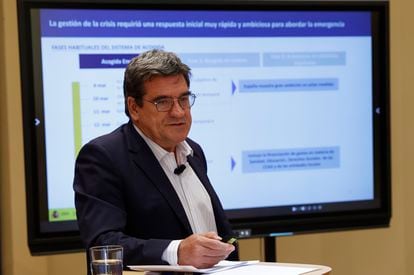The Minister of Inclusion, Social Security and Migration, José Luis Escrivá, takes stock of the management of refugees from Ukraine. JJ Guillén (EFE)
The Minister of Inclusion, Social Security and Migration, José Luis Escrivá, announced this Monday financial aid for those displaced by the war in Ukraine who are outside the public reception system.
The contribution will be channeled through subsidies to the autonomous communities and municipalities and, according to preliminary calculations, it may benefit some 40,000 displaced persons of the 125,000 who have arrived in Spain.
The aid, which will last six months from the time it is requested, will consist of 400 euros per month per family, to which 100 euros will be added for each minor in charge.
A family made up of the father, the mother and three minor children, for example, would receive 700 euros per month.
There is no set date yet for the implementation of the plan.
To access this benefit, applicants must already have temporary protection, the legal figure that has allowed the EU to give residence and work authorizations expressly to refugees from the war in Ukraine, and which Spain grants in 24 hours.
They must also be registered, have a Social Security number and demonstrate that they lack the financial means to cover their basic needs.
Compliance with these requirements will determine the final number of beneficiaries.
Currently, of the 125,000 Ukrainian refugees in Spain, only 21,000 are sheltered in public centers or hotels authorized by Immigration;
the rest, some 104,000 people, would be potential beneficiaries of the aid, although the initial calculation is that only 40% (40,000 people) meet the requirements.
More information
The exodus from Ukraine triggers the number of displaced people in the world to exceed 100 million
The lack of economic aid was one of the concerns of the Ukrainians who settled in Spain and of many of the families that have welcomed them.
Halyna Rybachok, a Ukrainian woman who lives in Madrid and who ran to the border to pick up her daughter and her two grandchildren as soon as the war broke out, told EL PAÍS in April of the difficulties in receiving them.
With pain in her legs and a salary of about 500 hours that she earns cleaning houses, she had a hard time stretching the budget to cover the new expenses.
Miguel Balaguer, an engineer from Alicante who welcomed a Ukrainian couple into his home, also expected some kind of financial support, but until now the aid (for maintenance or rent) was only for refugees who depend on the state reception system. .
"They are very concerned because they do not want to be a burden and they are very aware of the effort we are making," Balaguer told EL PAÍS.
"I don't want that money for myself, but part of what the government would spend on keeping them in a shelter and feeding them could be used to start organizing those who have preferred to live with a family."
The subsidies announced this Monday by Escrivá will not be delivered to the foster families but directly to the refugees, but it is deduced that they will thus help to cover the expenses they generate.
but part of what the government would spend on keeping them in a reception center and feeding them could be used to start organizing those who have preferred to live with a family.”
The subsidies announced this Monday by Escrivá will not be delivered to the foster families but directly to the refugees, but it is deduced that they will thus help to cover the expenses they generate.
but part of what the government would spend on keeping them in a reception center and feeding them could be used to start organizing those who have preferred to live with a family.”
The subsidies announced this Monday by Escrivá will not be delivered to the foster families but directly to the refugees, but it is deduced that they will thus help to cover the expenses they generate.
The minister took advantage of World Refugee Day to take stock of the reception of the displaced in Ukraine, a conflict that in just four months has forced more than 7.5 million people to leave the country.
The number of refugees arriving in Spain, some 125,000, already exceeds the 112,000 Ukrainians who made up the diaspora in the country.
The data also shows how the Ukrainian community has determined where the newcomers were settling, who have concentrated precisely in the regions where there were more compatriots installed.
Thus, three out of four refugees live in four autonomous communities: 24% in the Valencian Community, 23% in Catalonia, 15% in Madrid and 14% in Andalusia.
Spain is the fourth EU country in number of temporary protection resolutions granted.
Escrivá has highlighted the rapid labor inclusion of refugees, something "unusual" in other profiles.
According to his figures, there are 47,000 displaced persons with a social affiliation number and more than 8,100 working.
The Ukrainians have found employment, mainly in the hotel industry, where 30% of those who are working have been placed.
The other sectors where they have been most used have been construction, commerce, the field of administrative tasks, agriculture and manufacturing.

